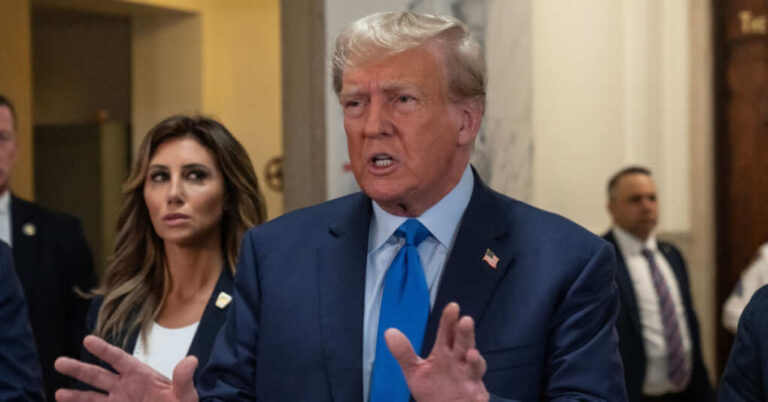
The Republican National Committee faced a pivotal moment regarding the 2024 presidential nominee after trying to pass a draft resolution to declare former President Donald Trump the party’s presumptive nominee for the upcoming election.
Initially championed by David Bossie, the RNC committeeman from Maryland, the draft resolution encountered unexpected resistance, primarily from the former president himself. Despite Trump’s initial approval of the resolution and his campaign’s endorsement, a subsequent wave of discontent prompted a sudden withdrawal. Trump, expressing concern over party unity, urged the RNC to halt the resolution’s progression, emphasizing the importance of finalizing matters democratically “AT THE BALLOT BOX.”
The abrupt reversal stemmed from mounting apprehension among Trump’s allies who feared the resolution could ignite tensions within the Republican Party, particularly among former South Carolina Governor Nikki Haley supporters. There were concerns that the resolution might be perceived as an attempt by Trump to exert undue influence and undermine potential contenders like Haley.
Haley quickly flipped the script, using the draft resolution as ammo against the former president.
In a savvy move, Nikki Haley’s campaign started raising funds, capitalizing on the idea that the Republican National Committee (RNC) favored Trump for the nomination.
Haley didn’t hold back. She criticized the RNC’s actions, suggesting they were trying to hand the nomination to Trump. In an email to potential donors, she said she wouldn’t let the party insiders dictate the nomination process. Instead, she expressed her strong commitment to winning the presidential nomination.
Bossie withdrew the resolution due to Trump’s opposition and the emerging discord within the party ranks.
Prominent figures in the Republican Party have recently rallied around Trump, especially after his significant victories in New Hampshire and Iowa, where he outpaced Haley by over 30,000 votes. These wins have prompted calls for Haley to consider stepping aside as party leaders urge unity behind Trump.
Earlier this week, RNC Chairwoman Ronna McDaniel emphasized the need for Republican unity on Fox News. She stressed the importance of rallying around the party’s eventual nominee, which she identified as Donald Trump.
In a recent Fox News interview, McDaniel said that she was looking at the “math and the path going forward” and didn’t see a Haley victory. “I think she’s run a great campaign, but I do think there is a message that’s coming out from the voters, which is very clear,” McDaniel noted.
According to current RNC regulations, Trump must secure 1,215 delegates to clinch the party’s nomination formally. As of Thursday, CNN’s estimates indicate that Trump has amassed 32 delegates, while Haley trails behind with 17.
McDaniel emphasized the advantages of party unity, both organizationally and in fundraising. She pointed to the Democrats’ success in leveraging Joe Biden’s presidency to raise substantial funds and highlighted the need for Republicans to consolidate their efforts. McDaniel suggested that redirecting focus toward Trump instead of internal divisions would ultimately benefit the party.
But Haley is having none of it. During an interview with NBC News, she expressed her concerns about the RNC’s impartiality in the nomination process. She criticized the RNC’s approach, highlighting that determining the nominee after only two states had voted was premature. Haley emphasized that securing the nomination required 1,215 delegates, most of which remained unallocated at this stage.
Democrats have no reservations about declaring a Biden victory in their party’s primary. In fact, they have tipped the scales to ensure it. As of January 2024, President Biden is the solitary Democratic primary candidate listed on the ballots in South Carolina, Michigan, Arkansas, California, Colorado, Iowa, Massachusetts, Minnesota, Oklahoma, Vermont, Virginia, and Georgia.
Late last year, Biden raised a few eyebrows when his campaign refused to file for the New Hampshire primary, making him the first incumbent president in over half a century to skip this early voting contest. It was viewed widely as a retaliation against voters in the state. During the 2020 New Hampshire primary, Biden encountered significant difficulties and ultimately finished a distant fifth place.
Following his inauguration, Biden, along with the Democratic National Committee, pursued changes to the primary order. Their proposal intended to move the first primary to South Carolina, a more diverse southern state where Biden clinched his initial primary victory in 2020.
Luckily, Trump opposed his party’s resolution for a far more democratic approach to victory. But Biden’s campaign uses dirty strategies, proving that Biden’s approach is anything but “democratic.”

